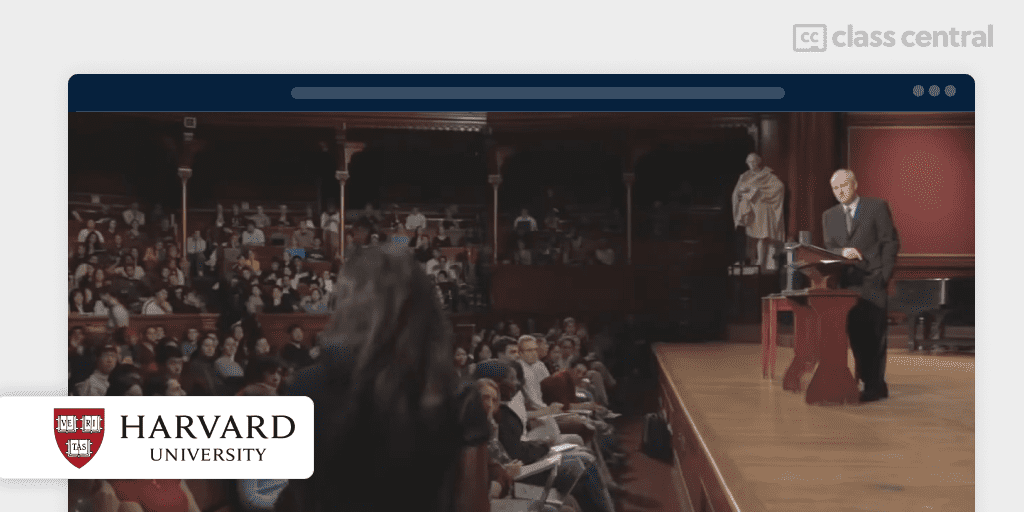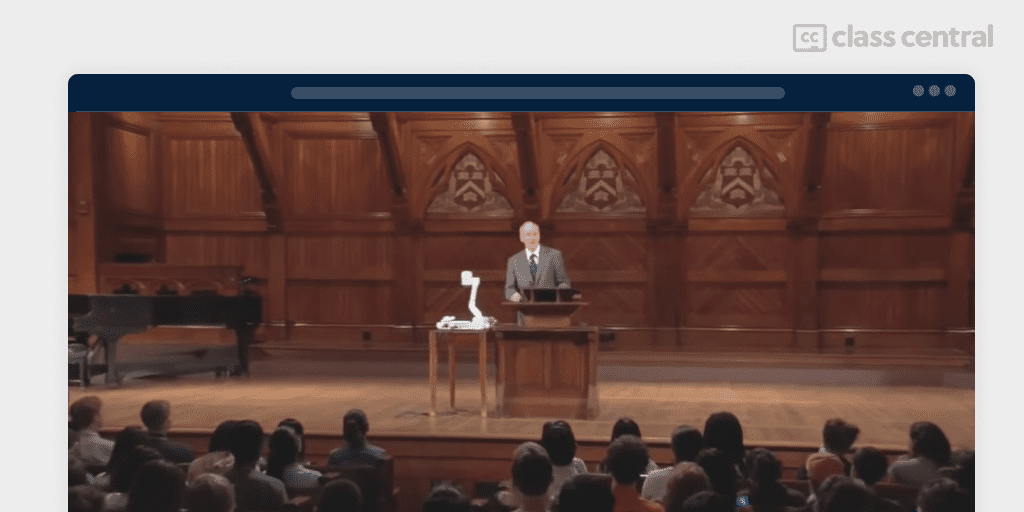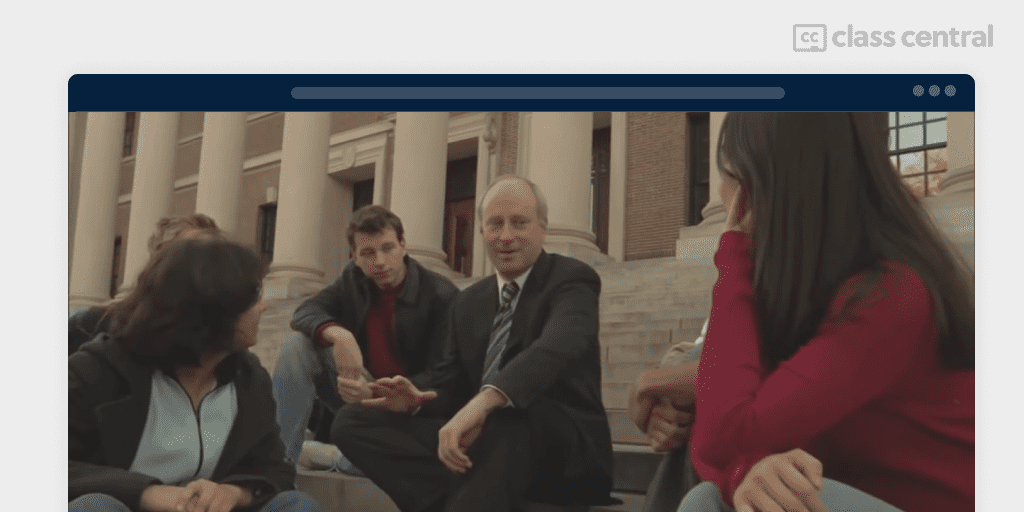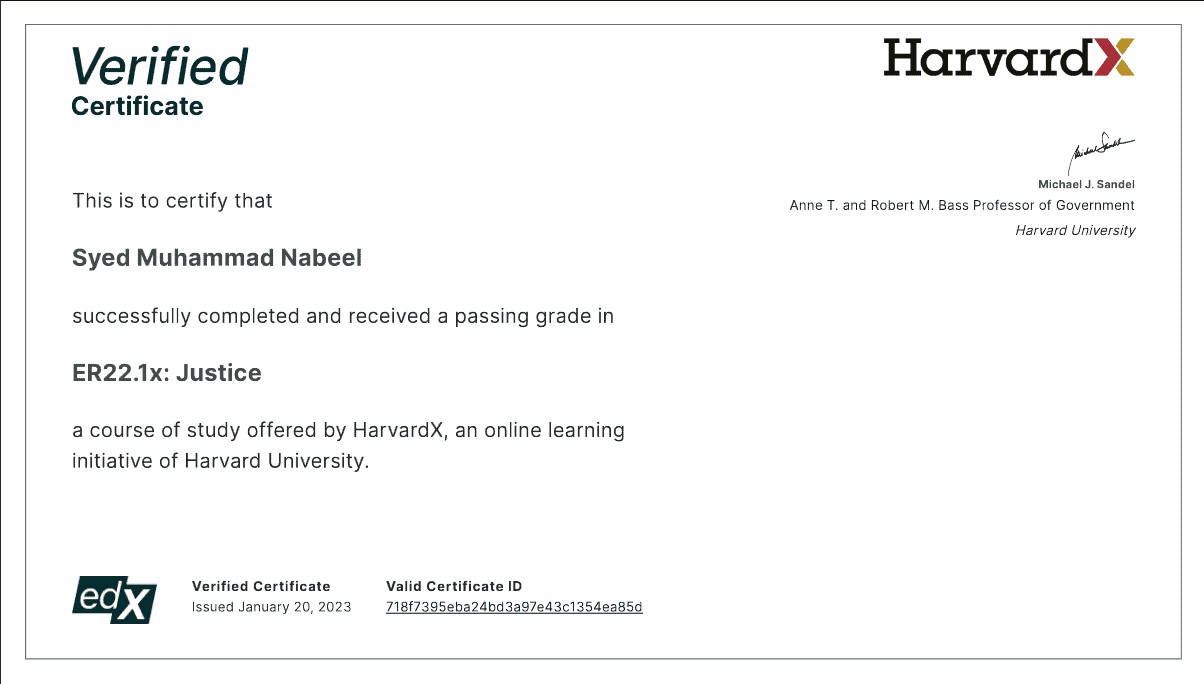Harvard’s Course Review: Justice
This free-to-audit course is taught by renowned Harvard professor Michael Sandel, with readings from Aristotle, John Locke, Immanuel Kant, contemporary philosophers, court cases, and much more.

The course I took last month is one of the most popular offered by Harvard on the edX platform. The course, titled Justice, is taught by Michael Sandel.
This course has also been featured in:
- [2023] The 250 Most Popular Online Courses of All Time
- Class Central’s Best Online Courses of All Time (2022 Edition)
Why I took this course
To be honest, it was the title itself that caught my eye. Justice is something that we, as part of a civilized society, try to maintain even when we don’t think about it. When we watch the news or see events unfolding among our friends or families, we try to judge based on a moral compass that we have both ingrained and learned from societal norms. So, keeping that in mind, it was intriguing to me what past philosophers and our secular research in this field have produced and what are the different ways of thinking about morality and how it is debated in the modern world so passionately (such as same-sex marriage, human rights, and affirmative action, among others).
The course has a large enrollment and great reviews on Class Central. Additionally, being offered by Harvard adds to the credibility of the material.
Lastly, I wanted to see how moral ideas are formed in a secular understanding of the world and how they stand against my views on morality. My moral views stem from religion, which ultimately relies on God’s commands as the absolute right and moral thing to do.
History of the course

The class is one of the oldest MOOCs on edX, and the recordings are almost a decade old. Nonetheless, it does not feel old but rather timeless. The decorum in these lectures, which were recorded with students present, and how intrigued those students were, was fascinating. There were times when I was so invested in the discussions that were happening that I yearned to be a part of that class and share my thoughts as well. This is something that the forums section on the course site does very well, which surprisingly are still very active.
Also, the first lecture of this course is available on YouTube and it is the most viewed lecture ever posted by Harvard. The lecture, The Moral Side of Murder,is as exciting as the name and hooks the inquisitive mind.
The instructor
The instructor is renowned in this field and has published a book on the same topics covered in the course. There are excerpts included in the course reading, which I found very engaging.
My Skills
Since this is an introductory class to justice and one of the best classes to get introduced to philosophy, not much preparation or prerequisite knowledge is required.
As for me, I have a background in Islamic Law, as I have a bachelor’s degree in Islamic studies, in which there were many courses on Principles of Deriving Islamic Law, Goals of Islamic Law, and so on. Of course, the religious moral code stems from the texts believed to be revealed by God, and the entire system is very different from how morality is developed by Aristotelean or Kantian thought. And this is exactly what I wanted to learn and focus on: how different philosophies like utilitarianism and libertarianism came into being and what roots they trace back to.
How to be successful in this course

To be successful, you need to have an open mind, ready to think and ponder over the questions posed by the course. One of the excellent things about this course was that after putting forward multiple views on the same subject, the professor did not enforce or encourage one point of view. Rather, the students were allowed to think, develop, and explore the different possibilities, which I believe allows a person to mature their moral thinking and moral compass. It may be easy to get confused or perhaps both sides of the argument may seem right (or wrong!), and that dilemma and struggle created within the learner is, I believe, the biggest win of this course. It softens the walls and opinions a student may be rigid upon and helps him/her to allow for a tolerance of other viewpoints.
The Course
The course is divided into 12 weeks, and each week has a lecture and reading material. The structure is very traditional, and each week has a discussion forum as well, which allows you to interact with other students and discuss/debate the different viewpoints put forward in the lecture. There is also a poll almost every week where students poll on things like same-sex marriage and affirmative action, and it’s always exciting to see what the trends among the students are. The lecture quality is very good, and all accessibility features from subtitles to transcripts are available. The recording quality (video and sound) is top-notch, and honestly, there is almost nothing for me to nit-pick on.
Grading and certificate
The class is graded on polls done every week, and there are quizzes every 4 weeks or so. The quizzes are open-book and are relevant to the material. There is also a final MCQ-based exam that can be attempted only once, and based on these graded assignments, a cumulative score of 70% or more grants you a certificate (paid).

Time Commitment
Depending on how quickly you want to complete this course, you can space out your study times. I spent a maximum of 4 hours a week and was able to complete the course within a month.
Conclusion
This course is an example of what MOOCs should be. It introduced me to a new subject (moral philosophy) and equipped me with the tools if I choose to further study and research this field. The course is thought-provoking and continues to be exciting right until the end. It is not only the best MOOC for philosophy but also one of the best MOOCs in general.
What Next?
I think for me, the next course would be Contract Law: From Trust to Promise to Contract, again offered by Harvard. I believe it diverges a bit from philosophy and goes into the actual implementation of laws and how we do that to prevail Justice in our society.







Ibad
Great read. Fascinating to hear a perspective from a person who has gone through the Islamic Views and is willing to expand their learning by inquiring and learning about different philosophies. Looking forward to hearing your take and review on Contract Law!